NES and Famicom: Recollections on the 30th Anniversary
We asked you, ourselves, and folks in the industry for their thoughts on a system that helped define video gaming.
This article first appeared on USgamer, a partner publication of VG247. Some content, such as this article, has been migrated to VG247 for posterity after USgamer's closure - but it has not been edited or further vetted by the VG247 team.
When Nintendo debuted its Famicom home console, they surely hoped for a hit. But they couldn't have predicted the worldwide impact the system would have, nor its lasting influence. On the occasion of the console's 30th birthday -- it debuted July 15, 1983 in Japan, with its U.S. counterpart the NES arriving more than two years later -- USgamer's editors and readers reflect on their fondest memories of the Nintendo Entertainment System.
We also asked Shigeru Miyamoto, key designer of NES pillars like Super Mario Bros. and The Legend of Zelda for his own reflections on the past 30 years of gaming. Rather than delving into specific Famicom memories, though, Miyamoto took a larger, more philosophical approach on how gaming has changed since the Famicom debuted. Because that's how he rolls.
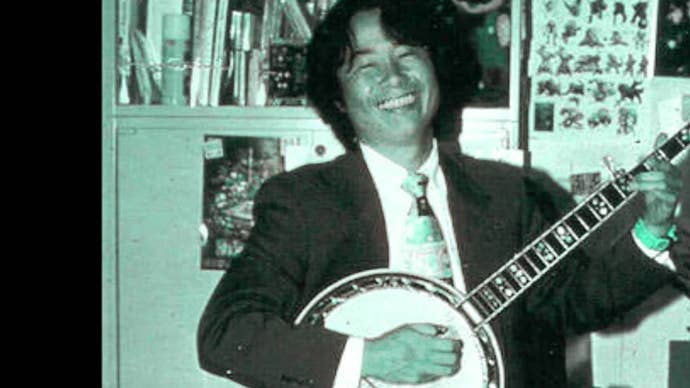
Shigeru Miyamoto, Nintendo executive, producer, and designer:
"For me personally, because the first projects I worked on were arcade games for the United States, I've always had a very global perspective in terms of what I've created. I've never really looked at Nintendo in terms of a local Japanese company that went global, but certainly when I think back on the number of years and back to the Famicom era and look at the new members of Nintendo nowadays I can certainly see how some of them may feel like it's a big global company all of a sudden.
"One of the things that really surprised me is when I first started we were making games for the arcades; back then the arcade machines were really using sort of the leading-edge technology in gaming and home console systems had technology that was sort of a level below the arcade machines. Certainly then we had the transition into the console industry, and even then you had the PCs which had the leading edge technology with the consoles sort of below that. And we've kind of come to a point now where the consoles themselves have the sort of leading-edge technology that everyone looks to when the new consoles are announced.
"The way that this flow and the change has occurred is something that's really surprised me. For me, it's always been about being there in the moment as those changes are happening and working with those changes and still trying to find within that ways to create entertainment that's new and unique."
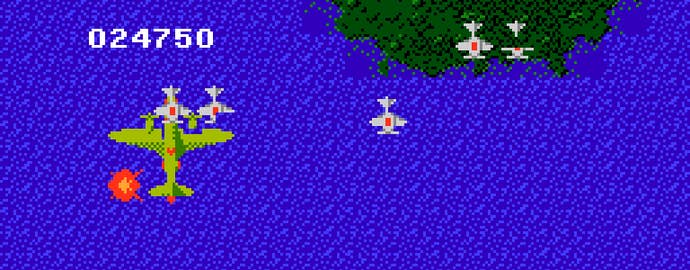
Victor Ireland, Gaijinworks president:
When the NES originally came out in limited release, the only place that I could find it in tiny Redding, CA was JC Penney. The problem was, they didn't carry most/all of the games. I really wanted 1942 and one other game. So I called Capcom -- like multiple times a week, explaining that they weren't available in Redding (this was way pre-Internet, pre-Amazon, etc.) and I really wanted to buy them. At some point they finally got sick of me calling and set me up as a distributor in their system so I could buy one copy of each from them. I still have the invoice with me listed as a distributor packed away. I was one of Capcom's earliest "distributors," and probably their youngest as well.
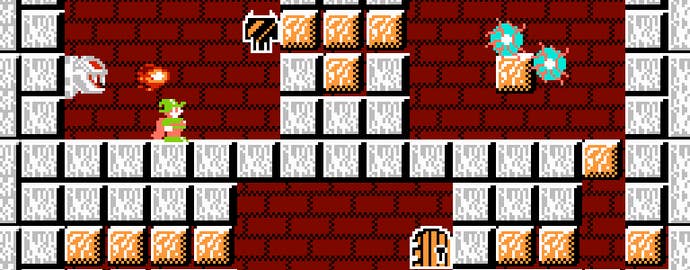
Mike Williams, USgamer editor:
Nintendo games were evil. Some were fun, some were innovative, but most of them were just punishingly hard. Battletoads required either super-speed reflexes or actual psychic powers to get through more than three levels. I remember getting Teenage Mutant Ninja Turtles and expecting end-to-end fun with some of my favorite childhood characters. Instead I got the harshest truth: While Leonardo and crew live in a cartoon world where they always succeeded, I lived in reality and death was just around the corner. There was the two-hit wonder that is the original Ghosts 'n Goblins. What about the maddening Solomon's Key, where you could actually end up with no way through your current level? The pain only got worse when the Game Boy came out.
The other thing I remember about the NES era was box art. Kids these days don't know how good they have it. Today, we have graphic designers who spend weeks designing and focus-testing the right box art. Back in the day, a publisher just had a sibling to do the covers, because they were already taking those drawing courses at community college. Everyone remembers the dire box art from the first Mega Man, but what about the traced Arnold Schwarznegger and Sly Stallone for Contra? Or the cover of Castle of Dragon, which looks like it was drawn by a five-year old. The sad part is a number of the games already had good cover art from the Japanese version of the game, but western publishers couldn't leave things alone.
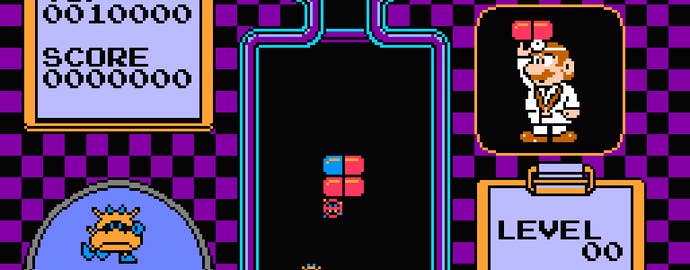
Christopher Bruce, USgamer reader:
Most of my memories of my NES are connected to my grandmother.
After I got my SNES, my NES went to my grandmother's house. I was there often because as a '90s latchkey kid, I went there after school and spent my summers there.
She actually played it with me a few times. I know we played a few innings of Bases Loaded, and we might have even played Super Mario Bros. 3 together one time.
Most of my memories come from playing in the summer. I never beat most of my NES games. I would play an hour or two and put it away, and then play the same section of the game later. One of the games that I thought I beat was quite embarrassing looking back. I played Dragon Warrior up to the point where you defeat the dragon and save the princess. I'm sure Anita Sarkeesian would have a field day with this, but I thought once I saved the princess the game was over. I thought it was odd that the game just left you to wander around, but I was pretty sure that I had beat the game until several years later.
The other memory that I have about the NES is that I'm pretty sure that the instruction book to Dr. Mario is the first thing that I ever read. At least, it was the first thing I ever remember reading. I was sitting in the backseat of my parents' Ford Bronco II with my mom coming home from Toys 'R Us after getting the game. She would help me sound out the words and explain how to play the game to my dad.
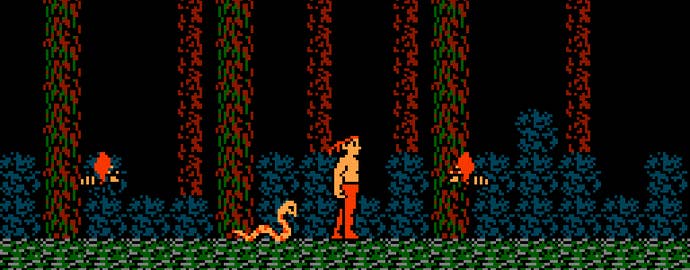
Brendan Sinclair, USgamer editor:
Nothing makes me sound like an octogenarian more than talking about the NES.
"Back in my day, we didn't have checkpoints. Or tutorials. Or GameFAQs. Games were hard. Games hated you. They punished you for daring to play them, but you kept coming back anyway because you had a sickness. We got one game on our birthday and one game for Christmas, and that was it. So if you got a game that sucked, it was all you had to play for months. Ask me how many times I beat Acclaim's craptacular Rambo? TOO DAMN MANY. And it wasn't one of those fancy cartridges with a battery backup like Zelda. It had passwords, and we were just glad they had a half-decent font. Most games didn't! They had the kind of passwords where you're never sure if something is a 0 or an O, where 1 looks the same as l. But we typed them in anyway, because it was August, and we weren't going to get anything new for months."
That's it. That's the NES experience. Lots of hard, repetitive games with rough edges that developers didn't think to smooth out for another decade or so. Games that, if you were good enough, could be beaten in half an hour or less. But you weren't good enough, and when you ran out of continues, you had to start over from square one. Ninja Gaiden. Battletoads. Silver Surfer. Ikari Warriors. Abadox. Games that you couldn't beat unless you cheated with a Game Genie from Galoob. And even then, some of them just refused to be beaten. That's what I think of when I think of the NES, and it gets my blood pressure up. And now I need to lie down, because my doctor said I need to cut down on spells and getting in a tizzy.
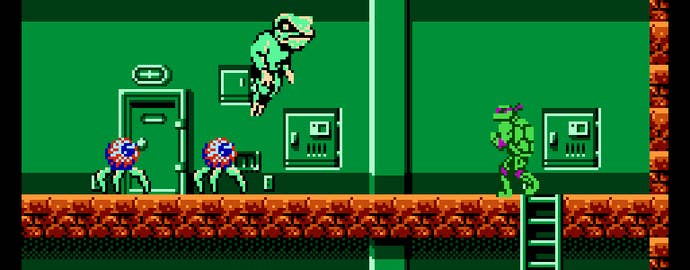
Joshua Henderson, USgamer reader:
My dad and I played a lot of NES together. My fondest memory is when we played the first TMNT game that, of course for the time, had no save feature. I remember leaving our console on for a good while, playing before and after church one Sunday. Glad it didn't burn our apartment down, now thinking about it.
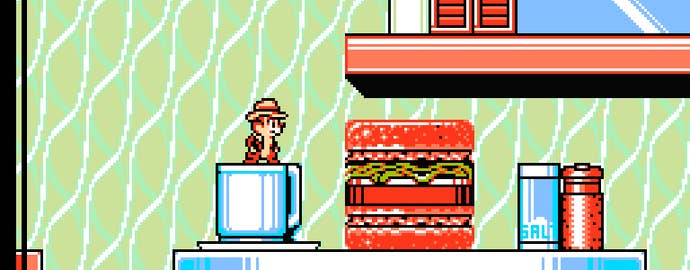
Dan Diemer, USgamer reader:
Of all the memories I associate with the NES as a kid, there is one that immediately jumps to mind:
In the spring of 1990 I had just turned 6 and had accumulated enough birthday gift money to buy a new NES game. I remember my mom taking me to the mall to pick out my new treasure, and upon entering the game store there was a single game that caught my eye.
The game was NARC, and it had everything an adolescent boy, obsessed with action figures, could want: Brightly colored action heroes, guns, sweet helmets, guns, a rad logo, guns.
I HAD to have it, and pleaded with my mom that it wasn't as violent as it looked. I used every tactic that my childish brain could muster, but in the end she just wouldn't have it. Instead, she posited that another game would be a better choice for my pliable, soft grey matter. For years I thought I had made the choice myself, never quite knowing why I had given up on that sweet, sweet gorefest, but now that I'm a parent I am fairly sure she guided my decision like some sort of parental gaming illuminati member.
In the end though, the wisdom she provided turned out to be sound, as the game she ushered into my arms was Capcom's Chip 'N Dale Rescue Rangers. I can't even count the hours of sibling aggression that spawned from me and my brother picking each other up and "helping" the other through the level. Rescue Rangers ended up being a seminal childhood experience, opening my eyes to the world of Capcom and games that I would go on to enjoy for years after.
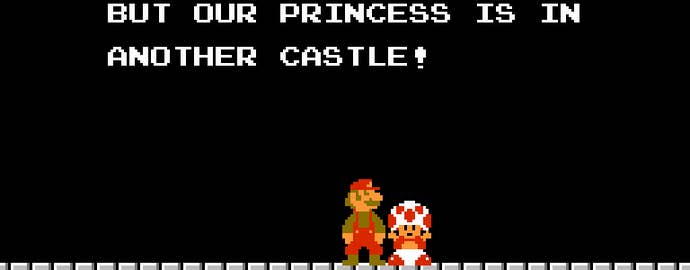
Cassandra Khaw, USgamer editor:
I remember the NES. I was obsessed with it. Most of my life's pre-grade school days revolved around the bloody contraption. And while I suspect that my parents had purchased me more than Super Mario Brothers and Duck Hunt, those are the only two things I recollect. (The sniggering dog in the latter would later come to acquire Muttley's voice in my head.)
Like a lot of other people, I'm willing to contribute my current obstinance with my encounters with the NES. Games really did hate you back then. They hated you even more if you were a little girl who was so short, your parents regulated your access to the console by moving the controllers out of reach. I wasted so many weeks trying to find the Princess. Never succeeded. I hope she's all right.
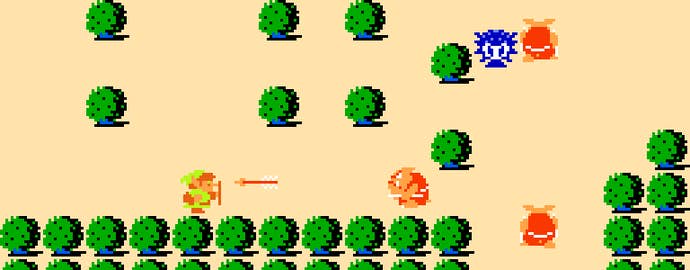
Stewart Smith, USgamer reader:
To this day, I can still remember where I was the first time I experienced the NES.
I am five years old. It's Christmas afternoon, 1986. I'm standing in the living room of my best friend, Brian Green's home. He finishes showing off most of his loot before walking over to the television and turning on a curious, grey box. Immediately filling the screen is filled with a glowing triangle, a cascading waterfall and from the speakers comes a tune that, to this day, still epitomizes one word: Adventure. The title "The Legend of Zelda" meant nothing to me, but based on those opening notes, I could tell that something grand was about to take place.
I was right.
I stared on in a mix of amazement and curiosity as Brian began controlling Link, taking him through a dungeon, slaying monsters and collecting rupees. I had no idea what I was looking at or what Brian was doing. I had never seen a video game before nor had any knowledge of what they were.
All I knew was that what I was watching was unlike anything I had ever seen before. And I had to experience it for myself. Much to my dismay, however, we left before I got a chance and it would be several months later that I would finally have the opportunity to do so. But from that moment on, I was hooked. Before even picking up a controller, I became a Nintendo Kid, something that would go on to define so much of my childhood, and continues to resonate as I'm not 32 and have yet to lose that love of gaming.
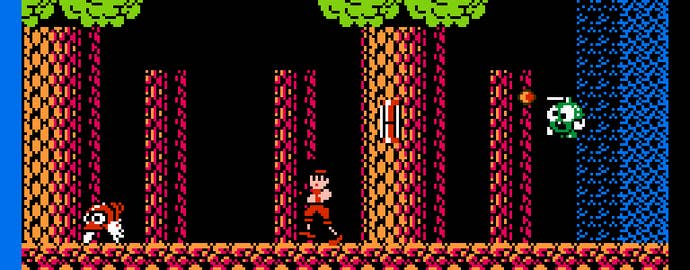
Jeremy Parish, USgamer editor:
The NES is what sent my hurtling down my current life path of writing constantly about video games, so I have a hard time isolating any single memory as a standout. I will say, however, that the thing I find most significant about the NES in hindsight is the sense of newness it brought.
I was certainly no stranger to video games by the time my brother and I chipped in together to buy an NES with the entirety of our gift cash from Christmas 1987. But the NES delivered new and different experiences at every turn, games unlike any other I'd ever played. The blaring calliope music of Super Mario Bros., its blue skies so bright and vivid. The haunting world of Metroid, a game that broke from the level-by-level structure of its peers and whose goal you had to uncover through methodical searching. Mega Man 2, with its tremendous graphics and music matched by perfect gameplay. Clash at Demonhead, dripping with delirious anime sensibilities before we knew what anime was. Somehow annihilating Chaos in Final Fantasy despite not having the first clue about RPGs.
And every time I got a new game, I remember peeling off the cellophane wrap as I sat in the back seat of my parents' car, thumbing through the manual to learn about lore and enemies. The influx of new knowledge made the wait to try my new prize almost bearable.
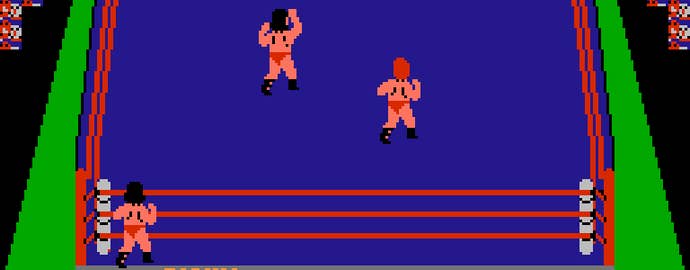
Johan Gregory, USgamer reader:
My three older brothers saved up their lawn mowing money to buy an NES once they started appearing in our local Best (remember that store?). When they finally went to buy it, I was allowed to tag along. They asked me what other game to get besides Karate Champ (the one they had all agreed upon). I was looking at the cover of Ghosts 'N Goblins, having no idea what it was but thinking the cover looked awesome. I pointed and said "that one." For some reason they thought I was pointed at Tag Team Wrestling and got that instead.
At least it came with Super Mario Bros.
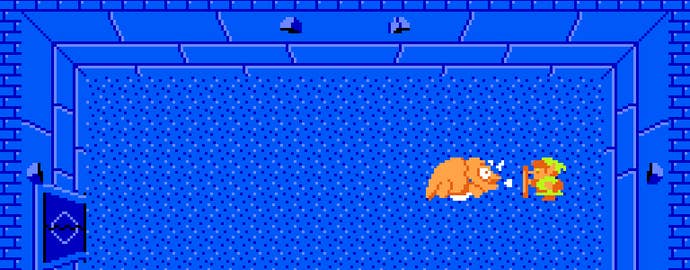
Aaron Wrotkowski, USgamer reader:
I learned how to read because of the NES. I was only three but I kept asking my parents what the old man would say in Legend of Zelda. My parents got tired of me asking all of the time and told me if I wanted to keep playing I had to learn how to read. So I got the “See Spot Run” books and worked at them until I could read any NES manual I had. I went back to the Legend of Zelda and the first message I got after my new found skill was, “Dodongo Dislike Smoke”. I was so afraid to ask my parents again what it meant that I just kept playing and eventually figured out that meant the bomb. Stupid reading. It always fails me.
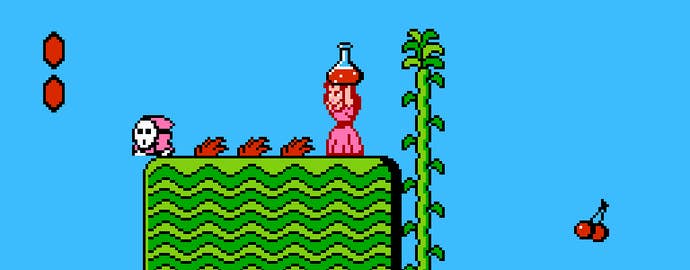
Pete Davison, USgamer editor:
I never owned a NES myself -- in that particular era of gaming I was very much a "computer" person rather than a console player -- but I had several friends who did. It was always a pleasure to get the chance to play things like Super Mario Bros, Mega Man, Tetris and the like because they were, in many cases, so very different from what I was enjoying on the 8- and 16-bit home computers I had at home. I often looked for home computer experiences that could match up to the greats on console -- particularly in the platform game genre -- but was regularly disappointed.
Thinking about it, my present love of the "underdogs" of gaming may well have started as early as the NES era; out of all the 8-bit Mario games, I found myself most drawn to Mario 2 for some reason, while that seemed to be an unpopular choice at the time. Similarly, I found the way Adventure of Link did things quite a bit more interesting than the original Legend of Zelda. I guess I've always been one to go against the grain!
The thing that's stayed with me most over the years, oddly enough, is the distinctive sound of the NES' sound chip. I loved those distinctive square-wave noises that burbled forth from the TV speakers, and I loved the fact that in several games (Castlevania and Zelda II, I believe) the sound effect of the main character getting hit sounded like them going "whoops" rather unenthusiastically.
I don't miss those controllers, though. Ergonomics have come a long way!
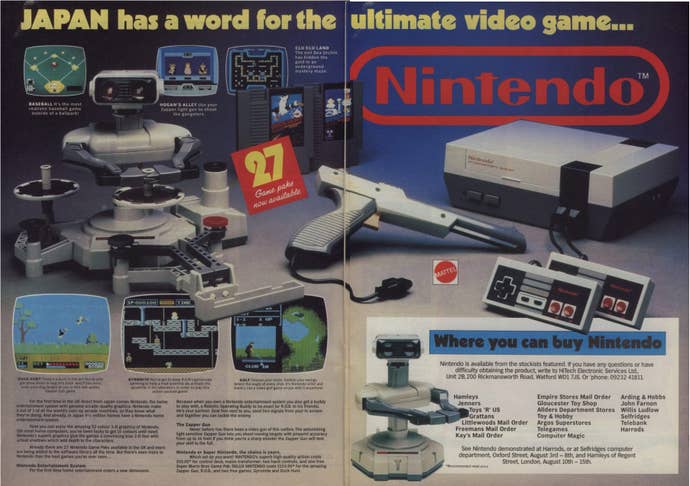
Jaz Rignall, USgamer last level boss:
I first heard about the NES back in very late 1985. At the time, I was working on a Commodore 64 magazine, and it was the height of Europe's 8-bit computer gaming boom. The word "console" was pretty much associated with the very out-of-date Atari VCS, so I was most surprised when a work colleague, Gary Penn, returned from visiting Activision’s office and just couldn't stop talking about this "Nintendo console" he’d been shown. He kept talking about a game called Excitebike, which he said was one of the best games he’d ever played. He also explained about these weird card-like controllers, which I decided I didn't like even before I saw them. I was nevertheless very intrigued about what he was saying, but soon forgot about it as we headed into Xmas.
Early in the New Year, I was invited down to Activision on a Press Event and while I was sitting in one of the demo rooms, noticed an unassuming grey shoe box on one of the shelves and realized it was the thing Gary had been talking about. I asked if I could play it, and the PR person said sure – but it took us a while to figure out how to get it to work. Back in the day, British analog TVs ran on a PAL format – which was different to the much more universally used NTSC. Because of that, anything originating from outside the UK needed an NTSC TV to run it– and also needed a 240v – 120v power converter because the UK power system is also different. So once we figured out which TV was the NTSC one, and how to hook up the power converter so we didn’t blow up the console, it finally burst into life, and the course of my gaming history was changed: the game already in the machine was Super Mario Brothers.
I really couldn’t believe how incredible the game looked. It was as smooth and as good-looking as a coin-op game, and such fun. And the moment I was told to stand on that pipe and pull down… I was absolutely hooked. The controllers that I’d decided I didn’t like didn’t take any getting used to: they worked fine and I didn’t even think about them. I was just entranced with what was on the screen. I finished the first level, and was about halfway through the second when the Activision PR guy told me it was time for us to go to another room to check out whatever game was next on the agenda. I remember feeling really annoyed: I just wanted to stay there and keep on playing. But I couldn’t, and had to tear myself away. I knew I wanted this system NOW… but didn’t have the means to get one from the US – or a TV to run it on. So I had to wait another year before the NES was launched in the UK, which I bought on day one of its release – along with Mario Brothers. Mario Brothers? Yes. As I quickly discovered after setting up the NES and plugging the cartridge into my new system, the game I’d bought with my new console wasn’t Super Mario Brothers, just plain old regular Mario Brothers. Since I’d only had a brief time with Super Mario Brothers, I’d failed to really take in its full name, and knew it as Mario Brothers. I remember being simultaneously completely and utterly crestfallen, and furiously frustrated over what was quite likely my most disappointing gaming moment ever. This wasn't the Mario Brothers I was looking for...
I’d have to wait another six months before Super Mario was finally released in the UK, and I was literally counting the days until I finally got hold of a copy. I remember sitting on a train home after picking it up, reading the instruction manual to pass the time and getting more and more excited. I ran home and plugged it straight in, and started playing and didn't stop until sometime early the next morning when I realized I hadn't eaten for about 10 hours. Few games have ever had that kind of impact on me.
